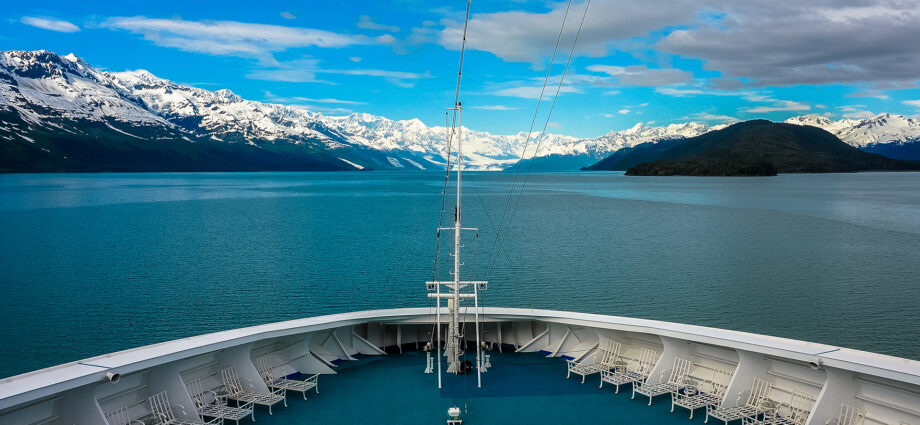
Cruise ships are environmentally destructive. Amid industry greenwashing, why wait to enact anti-dumping regulations and a ban on heavy fuel oil?
by Anna Barford. Originally published on Policy Options
December 5, 2022
The Alaska cruise season is all but over now for the year, but the pollution legacy of the massive ships that passed through B.C. waters remains. Several tourism business groups are celebrating the return to normal with plans for an even bigger cruise season in 2023. Unfortunately, as regulations stand, the pollution footprint of the cruise sector will also be returning to the West Coast next summer.
Greenwashing campaigns by the cruise ship industry with the creation of so-called “green corridors” should not placate the public. More needs to be done. The ocean faces overlapping crises of rapidly escalating climate change and biodiversity collapse, and there are a lot of actions to take. Many large-scale solutions are at our fingertips.
With the Biodiversity Conference of Parties (CBD COP15) happening in Montreal this month, Canada’s lack of leadership on protecting ocean biodiversity will be under international scrutiny. Federal policy-makers and regulators must address the biodiversity crisis happening within our borders and territorial seas. Transport Canada should implement mandatory anti-dumping regulations across all vessel types for sewage and greywater. It should also end all dumping of toxic fossil-fuel wastes in our oceans by banning heavy fuel oil. We need not only mandatory regulations, but transparent oversight in the form of public reporting, independent observers on vessels, and annual maintenance and performance testing for wastewater treatment systems. This should be happening now and certainly before another cruise ship season starts.
Ban on heavy fuel in the Arctic is too weak
Support for Oil Tanker Moratorium Act has history on its side
Shipping is a highly polluting industry, and travel by cruise ship is the most environmentally destructive option for travel available to the mass market. Cruise ships produce more greenhouse gases per passenger-kilometre than air travel.
These floating resorts also generate huge volumes of sewage and greywater that are more contaminated than those from cities. There is also acidic fossil-fuel waste dumping and an increased oil spill hazard as a result of the industry’s choice to use heavy fuel oils. This industry presents major challenges for the ocean.
As the West Coast-to-Alaska cruise ship season began ramping up in spring 2022, a hope-inspiring announcement was made by a new group, the First Movers Commitment. The group promised talks to establish the first green cruise corridor in the world on the Alaska cruise route.
First Movers Commitment may be a play on First Movers Coalition, a group announced at the climate COP last year in Glasgow. That global coalition is a partnership between governments and industries to work in hard-to-decarbonize sectors such as shipping, cement, aviation and aluminum. While far from perfect, it does provide transparency and accountability about decarbonization pathways of coalition members.
None of the members of this Alaska cruise First Movers Commitment appears to be members or partners in the global First Movers Coalition.
Globally, green corridors are voluntary mechanisms now being used in the shipping industry that focus on greenhouse gases. While these climate pollution reductions are urgently needed, the current definition of green corridors ignores the waste dumping for which these ships are responsible.
These waste streams contain toxic contaminants that can be deadly to plankton and other marine creatures, cause issues in already at-risk salmon and migrate up the food chain to the endangered southern resident killer whales and communities that depend on seafood. Dumped wastes contribute to algae blooms, force the closing of beaches and create oxygen-free dead zones – none of which is good for marine ecosystems or a burgeoning blue economy.
Let’s be clear – the green cruise corridor announcement was only a promise to meet and talk. It was not a commitment to action for the 2022 or even 2023 season, nor was it a commitment to transparency or inclusion of non-industry stakeholders.
Many pollution-prevention solutions can be implemented by ship operators and regulators right now. The announcement could have detailed mandatory and widespread speed limits to increase fuel efficiency; definitions of what will be considered “green” fuels for the corridor; expanding sewage no-discharge zones already in place under the U.S. Environmental Protection Agency; and investing in energy-efficiency retrofits with available technology. Instead, this announcement promised nothing.
Subscribe to our newsletter.
Mandatory anti-dumping regulations for sewage and greywater, and a ban on heavy fuel oil are necessary first steps that should be taken without delay. This will do far more than a voluntary green corridor plan that has zero teeth and is greenwashing at best.
This article first appeared on Policy Options and is republished here under a Creative Commons license.


